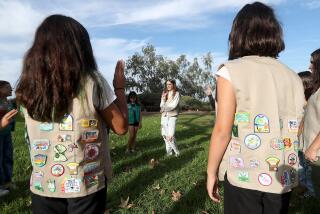Kids With No Blankets? They’ve Got ‘Em Covered
- Share via
Remember your blanky? That tattered, threadbare square of cloth with a name and the power to protect you from all the scary stuff you confronted as a kid?
Now imagine that your world is at its scariest because you have this disease and your mommy and daddy are always crying and you feel so weak, and you’re so scared. And you have no blanky.
Susan Finch, a young mother who lives in Laguna Niguel, doesn’t want any child, at any age, to be without a warm, comforting friend at such a scary time. That’s why she started Binky Patrol, Comforting Covers for Kids, seven years ago.
She and four other volunteers began modestly, knitting and sewing a few dozen “binkies” that went to ill, abused or troubled youngsters in Orange County. (Finch came up with “Binky” from a nickname given to a homeless man in Laguna Beach who sometimes wore a blanket on his head.) Within two months, thanks largely to a mention on “The Oprah Winfrey Show,” the Binky Patrol became a national phenomenon, with 60 chapters and thousands of blankets going to children throughout the country.
“I had 800 phone calls in two days,” after the Oprah show, she said, from people wanting to help and start chapters.
Today, there are 15 chapters in Orange County and 160 nationwide, Finch said.
The chapters are intentionally autonomous, Finch said, because she does not want to dictate from afar how to make binkies or how to distribute them. She insists only that the volunteers give something that “reminds a child that no matter what the situation is, somebody cares about them and loves them and they are not forgotten,” she said.
Finch said she won’t hesitate to “fire” volunteers or disband chapters if their motivation veers from that central tenet. “If a chapter says they don’t want to give to a [particular] group, they’re out,” she said. “There’s no criteria, no rules for giving.”
She bristles at the idea that a volunteer or a chapter is insulted if the recipient doesn’t take time to thank them for the binkies and has even disbanded some chapters for such behavior.
The shelters for battered mothers and their children are typically staffed by volunteers or employees who “are underpaid and understaffed. Their focus should be on serving their clients, not sending thank-you notes to binky people,” Finch said.
A small blanket can do wonderful things not only for the child, but for the parents who watch their child’s eyes light up when someone hands them their very own binky.
“Gosh, some of [the children] don’t even have beds,” said Kim Etlinger, a specialist with New Alternatives, a nonprofit group that serves abused, neglected, abandoned and emotionally disturbed children.
When Etlinger was trying to find something to help comfort the children, she came across the Binky Patrol website, www.binkypatrol.org, made a few phone calls and within a day or two, she said, arrangements were being made to hand over about 60 binkies.
More and more have been donated since, Etlinger said, and the kids love them. “They are so soft and cuddly, and they are adorable,” she said.
Binkies can be sewn, crocheted, quilted or cut from squares of cloth with fringes tied at the end. They should be at least 36 inches square and easy to care for. Parents have enough to worry about, Finch said, without having to follow fabric-care instructions. The comforting effect of a binky is not limited to the young children, either, Finch said. Kids are typically amazed and happy to get a binky, she said, but “especially the teen boys, because they are so used to being skipped over. A teen boy will go to mush when you give him a binky.”
Every year, the group holds a national Bink-a-Thon, a marathon sewing, quilting and crocheting session to see how many binkies the volunteers can make in six hours.
At the last south Orange County Bink-a-Thon, “we made 308 binkies in six hours with 75 volunteers,” Finch said.
She estimates that the group has made and handed out more than 175,000 binkies in seven years.
But the need, she notes, unfortunately is still vast.


